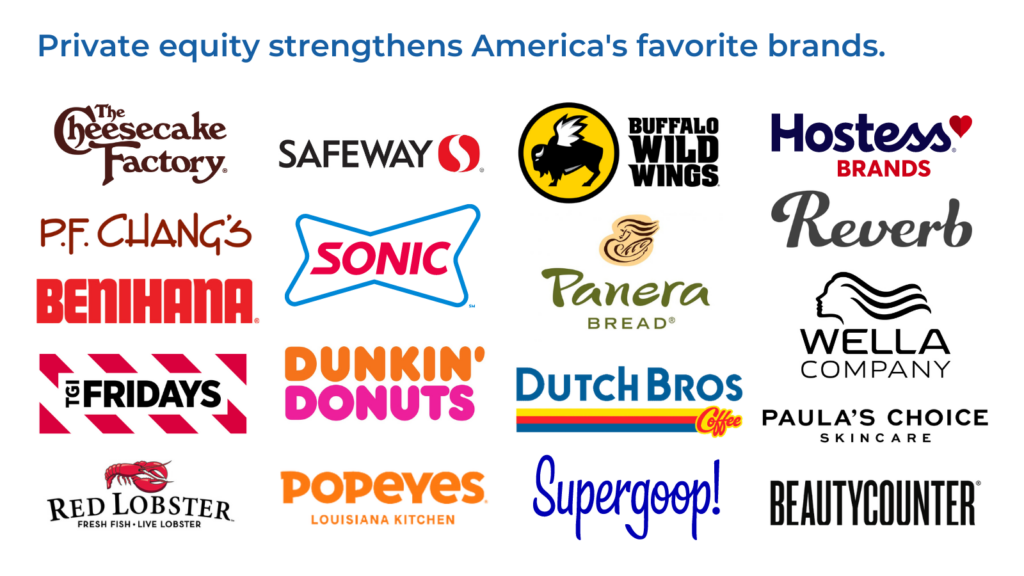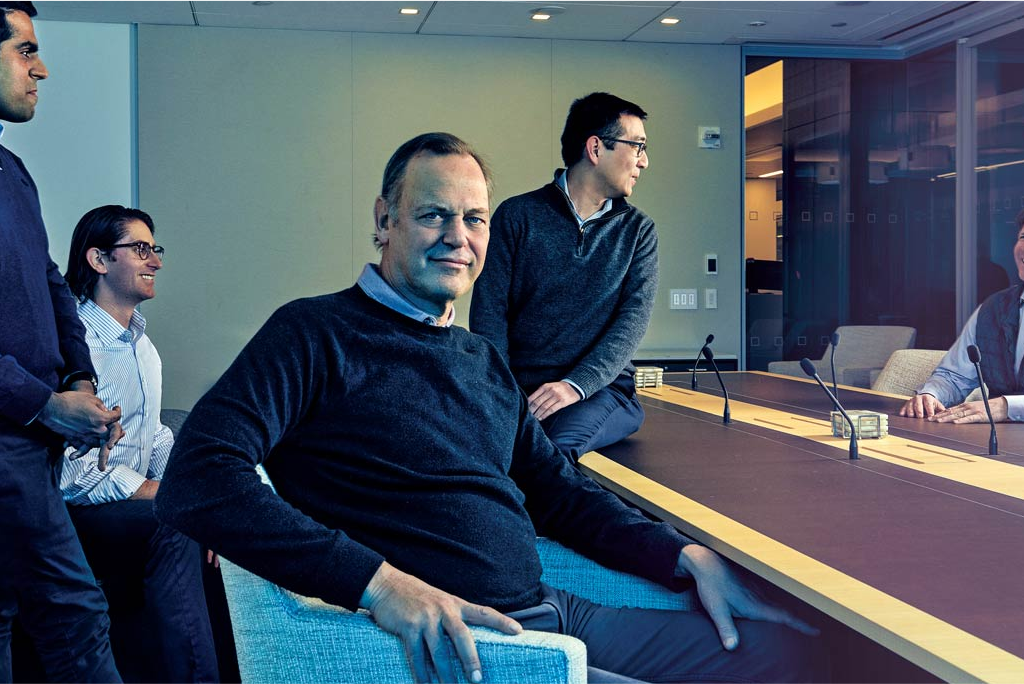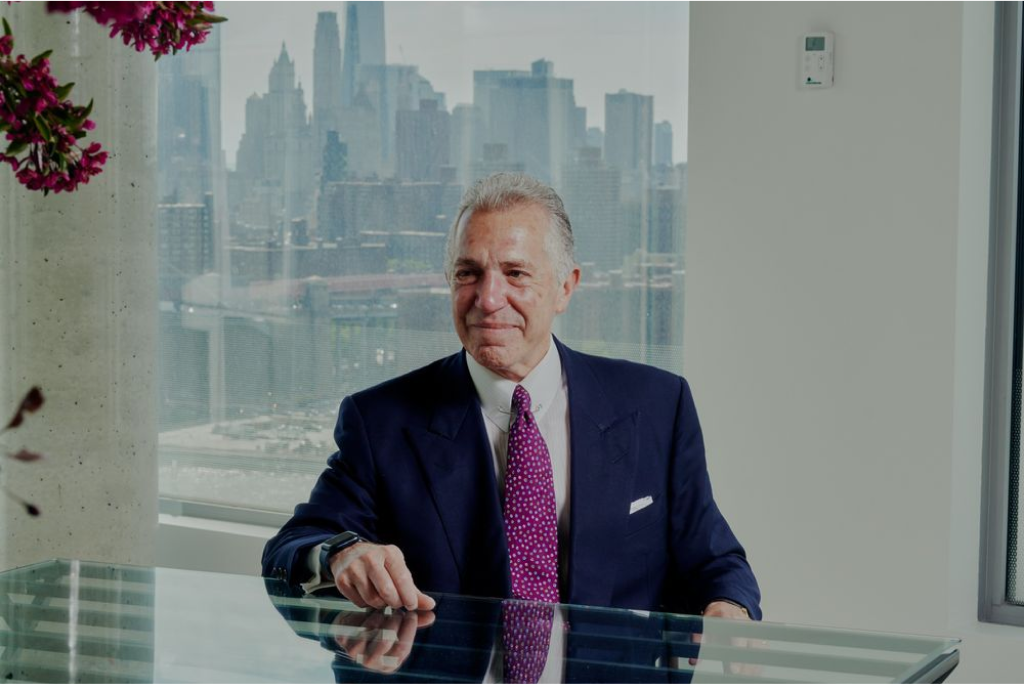
These are The Builders
Get the facts and hear real stories about how private equity is building better businesses, supporting workers, and strengthening retirements across America.
Private equity builds better businesses across America, directly employs millions of workers, and delivers the strongest returns to support the retirements of millions of workers. Private equity has partnered with some of the most popular brands and companies Americans patron every day — allowing these businesses to modernize, grow, and meet ever-changing consumer demands.

The American Investment Council compiled widely accepted data, studies, and examples showing how of private equity invests in small businesses, improves health care, supports workers, and strengthens retirement for millions of pension beneficiaries in all 50 states.
Supporting Small Businesses and Workers
Private equity has a long and strong track record of supporting small businesses, and the majority of deals are successful. In 2022 alone, 85 percent of private equity investments went to support small businesses with fewer than 500 employees. These investments played a critical role allowing anyone with a good idea, hard work, and a bit of luck to achieve the American dream.
Hear from real entrepreneurs about how private equity provides opportunity and growth through investment and expertise.
Improving Health Care
Private equity plays a critical role in supporting quality, affordable health care in the United States. For decades, private equity-funded innovations have delivered more effective treatments and saved lives — and, importantly, helped lower health care costs and increase access to lifesaving care for millions of Americans.
- Increasing Health Care Access – Rural America has a profound health care deficit, and much of that problem boils down to a lack of resources: relatively few providers, less insurance coverage, and fewer health care professionals compared to urban and suburban areas. Fortunately, private equity is filling that gap by investing in urgent care providers that have identified business models that work in rural and underserved communities.
- Supporting Nursing Homes, Hospitals, and Physician Practices – In 2021, the Medicare Payment Advisory Commission (MedPAC) released a report reaffirming that private equity investments play an important role providing hospitals, nursing homes, and physician practices with capital and expertise to navigate an increasingly complex health care landscape.
- Investing Billions in Health Care – According to data compiled by Pitchbook, private equity invested more than $206 billion in U.S. health care throughout 2021 to fund research into deadly diseases like Alzheimer’s and Parkinson’s, expand and renovate facilities, modernize medical records and health care data, and make other needed investments.
- Investing in Medical Technologies that Improve Lives – By partnering with companies across the life sciences spectrum, private equity provides financial support and strategic advice to develop innovative technologies and devices that benefit patients and improve lives. In the last decade alone, private equity has invested $280 billion across more than 1,800 life sciences and medical device companies in the U.S. More than 900 medical device and supply companies have been supported by private equity firms in the last 10 years.
Strengthening Retirements and Diversifying Pension Funds
The data is clear. Private equity has a long and consistent track record of delivering the strongest returns to help support public pension funds and millions of their beneficiaries.
How does private equity help diversify pensions and strengthen retirement for millions of public servants? Private equity firms partner with their investors – which include public pension funds – to buy companies and work to improve their performance, creating jobs and long-term value in the process. The returns from these ventures go directly to the firm’s investors, most of whom are public pension funds.
As part of a diversified investment portfolio, private equity is consistently the highest returning asset class for public pensions, delivering median annualized returns of 15 percent over a 10-year period. As of 2021, 34 million American public servants depend on private to support their retirements, while 89 percent of public pension funds invest at least part of their portfolio in private equity.

Private Equity is Critical for Diversified Portfolios
In addition to delivering strong returns, private equity also represents one of the most stable and secure long-term investments for institutional investors. As public markets grow more volatile, private equity serves as an increasingly important tool for diversified pension funds looking for reliable investments that can weather these abrupt shifts in market sentiment.
Northwestern Kellogg School – The Great Recession offered the ultimate validation of private equity’s long-term stability. A study by the Kellogg School of Public Management at Northwestern University found that “companies backed by private equity firms were more resilient in the face of the financial crisis compared to their counterparts
Cambridge Associates – A recent study published by Cambridge Associates found that over the last decade, “institutions with higher private investment allocations experienced higher returns historically. And, those returns tended to be less volatile.” In addition, institutions with higher allocations to private investments have outperformed those with lower allocations.
Improving Sustainability
Private equity is expanding its clean technology footprint, including a range of renewable energy solutions – such as solar, wind, and hydroelectric – as well as areas like electric vehicles, waste management, food production and supply chain sustainability, and recycling solutions.

- Renewable Energy: Private equity has invested over $100 billion in renewable energy since 2010 and $21.5 billion in renewables in 2021 alone, including more than $6 billion in solar and wind projects.
- Sustainable Food Production: Over the past decade, private equity firms have sponsored 135 agtech companies at the nexus of food production and technology, totaling nearly $5 billion in capital. A key example is private equity’s investment in soil sensors, which have helped farmers save money on water costs and enhance yields.
- Cleaning Up the Planet: Private equity has a long history of investing in environmental services, including areas like waste management, recycling centers, and oilfield cleanup services. Firms invested in 142 deals and a record $17.2 billion in the environmental services sector in 2021. Over the past decade, private equity firms have sponsored 935 environmental service companies, totaling almost $100 billion in capital.
- Impact Fundraising: Over the past decade, US-based impact investors have raised more than 250 funds and a combined $66 billion of available capital.
Building Better Businesses
Private equity has provided large-scale investments to improve businesses by unlocking their value and setting them up for long-term success.
From increased 401(k) contributions and new healthcare options to expanded parental leave policies, private equity investments better position businesses to succeed in a competitive market and enhance the well-being of employees at companies of all sizes.

Wall Street Journal – Blackstone Selling Vegas Casino, Firm’s Most Profitable Property Deal
“Blackstone Inc. has reached an agreement to sell the Cosmopolitan casino and hotel on the Las Vegas Strip for $5.65 billion, the company said on Monday, and told investors in a private letter that the sale is the company’s most profitable of a single asset ever. Blackstone acquired the two-tower property for about $1.8 billion seven years ago and spent an additional $500 million on upgrades, including renovating the nearly 3,000 guest rooms, building luxury suites and adding new restaurants and bars. Total profits after the sale would be about $4.1 billion, including cash flow from the property’s operations.” … READ MORE

The Strategy Story – Blackstone and Hilton Hotels: The Beauty of LBOs
“There is always a certain amount of uncertainty involved with the financial markets. Most of the time is spent in speculation about the impact of future events. But time and again, there have been examples of companies generating alpha in contradiction to the general sentiments. One such example is Hilton Worldwide … In 2018 when Blackstone group finally sold the last remaining stake in the company, it had realized profits close to $14 Billion (almost 3x returns). But how did Blackstone do it? It used a strategy called the Leveraged Buyout.” … READ MORE

Harvard Business Review – Blue Yonder, The CEO of New Mountain Capital on Using PE Management to Ignite Growth
“Twelve years ago, in 2010, the private equity firm New Mountain Capital acquired a little-known Wisconsin software company, RedPrairie, for $565 million. In September 2021 it sold that same company, now named Blue Yonder, for $8.5 billion to Panasonic. About $5.7 billion of the gain had come from organic growth, not acquisitions. That success wasn’t driven by any specific lucky break, technology breakthrough, or new product. Rather, it was the result of continual investment and improvement in the company’s management, strategy, and governance.” … READ MORE

The Riverside Company – Growth Stories – Tate’s Bake Shop
“Tate’s Bake Shop makes cookies and baked goods that deliver a homemade taste that consumers crave. Riverside’s team helped the company dramatically expand its production, distribution and footprint. During a hold of just under four years, Tate’s grew from a regional player to a brand in more than 70% of all U.S. groceries, contracts with big-box stores and entry into the convenience market.” … READ MORE

Who Will Inherit the Family Business? Often, It’s Private Equity
“The deals help aging business owners ensure a future for their companies after they are gone. Many are finding that their own children aren’t interested in taking over. Those whose children want to remain involved recognize that their offspring will need additional technological and financial know-how. Even owners who want to keep working are often looking to untangle some of their wealth from their businesses. They are ready to share the risk they have shouldered alone for years.” … READ MORE

